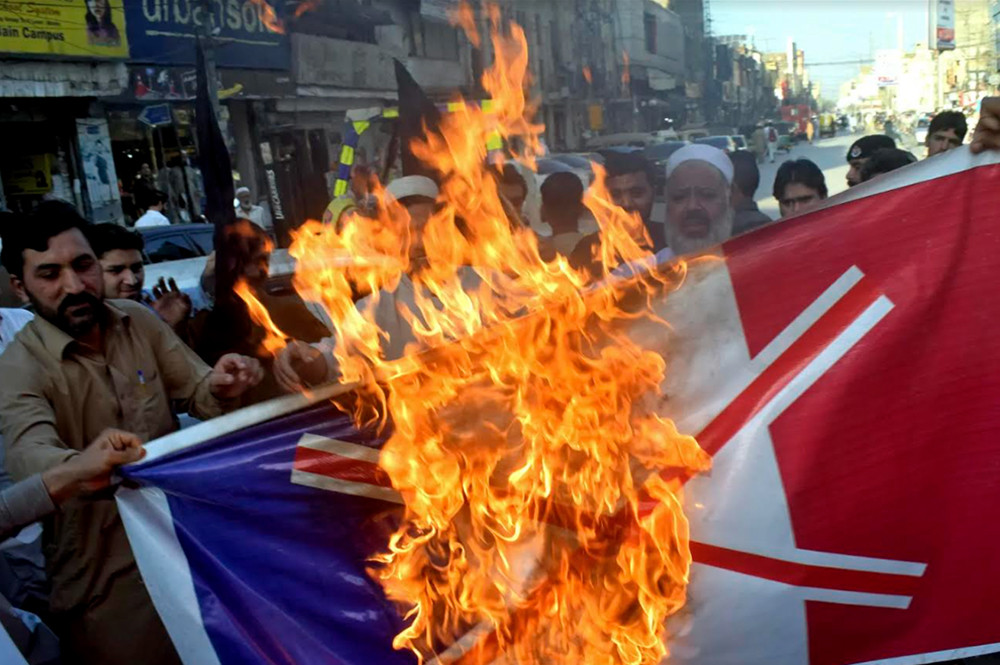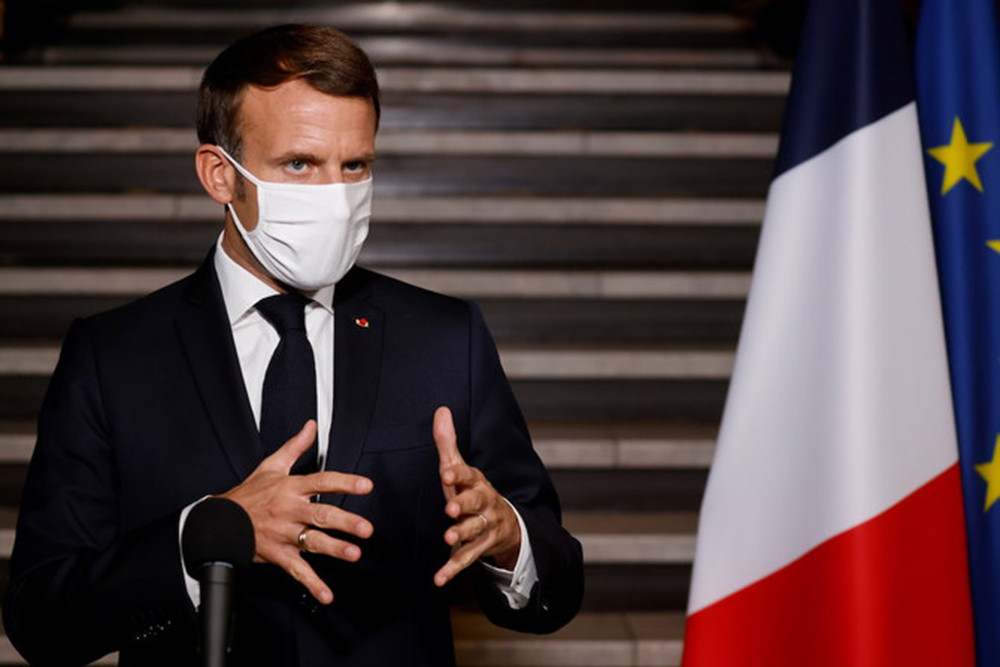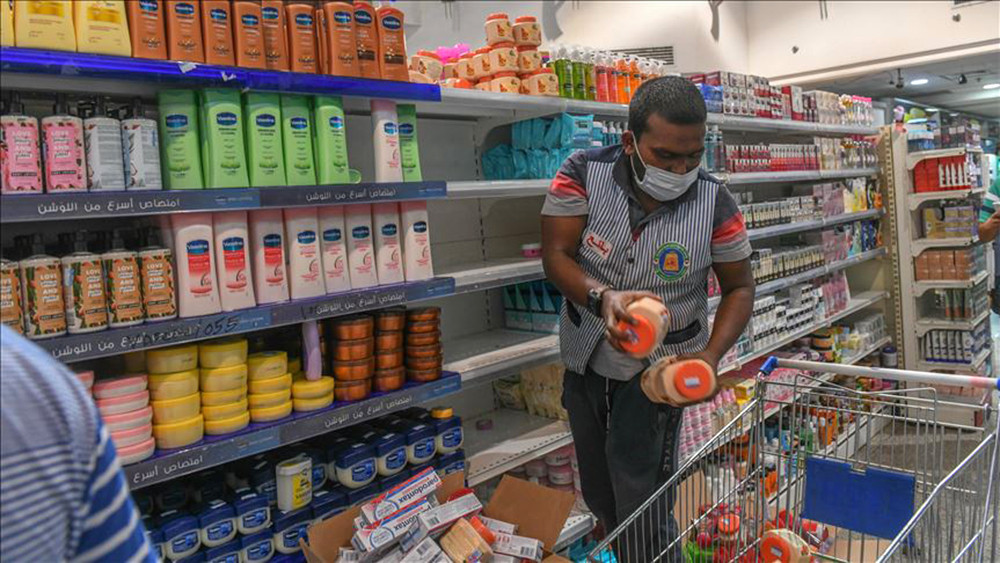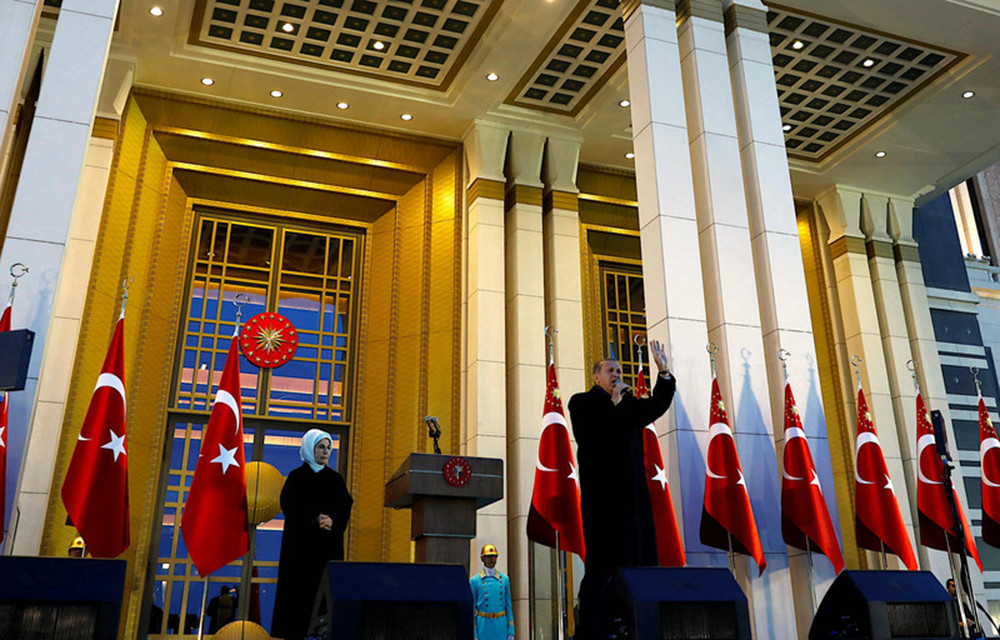Tensions between France and the Muslim world: When oil is added to the fire
(Baonghean.vn) - From Saudi Arabia to Bangladesh, Iran to Morocco, many countries are expressing dissatisfaction with France's treatment of Muslims. This wave of protests threatens to divide the Western European country and much of the Muslim world.
The fire of anger burns
The issue of religion and ethnicity between the Muslim world and the West has always been a sensitive topic, especially in recent years when radical Islam is one of the issues threatening the security of European countries. The fire of anger burned across the Muslim world after the statement ofFrench President Emmanuel Macronthat “will continue to defend the right to draw cartoons of Mohamed.”
The incident began in mid-October when French high school teacher Samuel Paty was beheaded by a Chechen for showing his students caricatures of the Prophet Mohammed in a class on freedom of expression. In response, the French government turned Paty into a free speech hero. President Macron affirmed that France “will continue the fight for freedom” and “intensify” efforts to end Islamic extremism in the country.
Part of that campaign is to create a “French Islam,” as he has said for years, aimed at integrating Muslims into French society. Macron says extremists are standing in the way of that integration, and his government has begun carrying out raids, expulsions, and disbandments of certain Muslim groups. Authorities have also not banned images of caricatures of the Prophet from being projected onto French government buildings during national commemorations.
 |
| Pakistani traders burn the French flag during a protest on October 26. AP photo |
The diplomatic war of words also quickly spread to the practical actions of the people.
However, for thousands of Muslims around the world, they believe that France is against a religion and they speak out against it. Organizations and governments of many Middle Eastern countries criticized Mr. Macron's speech for spreading hatred between peoples. The diplomatic war of words also quickly spread to the actual actions of the people. Since October 25, French products have been removed from the shelves of many supermarkets in Jordan, Qatar and Kuwait. Some items such as hair care products and cosmetics of French origin have also disappeared from the display shelves.
The message from the Muslim world is clear: If a country allows cartoons of the Prophet Mohammed to be published, it will suffer a major economic impact. But how well such a message is received and the consequences depend on many factors, with experts believing that these are just temporary emotional events that will quickly pass.
Message from France
French President Macron’s latest statement is probably not the only reason for the outrage in the Muslim world. More than 3 weeks ago, just before the terrorist attack on teacher Samuel Paty, French President Macron gave an important speech to present France’s new policy to fight what he called “separatism”. “What we have to attack is Islamic separatism,” Mr. Macron emphasized.
 |
| President Emmanuel Macron said “we know what needs to be done” after a meeting with a unit tackling Islamic extremism in a northeastern suburb of Paris. Photo: Reuters |
Along with this assertion, Mr. Macron also proposed very specific measures, such as ending the situation of Muslim clerics being trained abroad, especially from countries such as Türkiye, Morocco, Algeria, etc., and then sent to mosques in France. Mr. Macron said that this makes France unable to control the doctrinal content that these clerics teach, and many of them propagate hateful ideas, which go against the values of the French Republic. The second notable measure is to tighten financial control of religious establishments, especially Islamic ones, to prevent foreign powers from manipulating these establishments.
There are two main reasons for French President Macron's introduction of this policy. First, for a long timethe problem of radical Islamhas been one of the biggest security concerns for France, threatening to destroy the foundations of French society from within. That is why, over the past two decades, every French president has had to deal with this challenge. The fact that Mr. Macron has only introduced a new policy after more than three years in power is even considered too late.
The second, very important reason is that the 2022 French presidential election is approaching very soon and the topic of radical Islam will certainly be one of the topics that French voters are most interested in. This is the strength of right-wing parties, especially the far-right party "National Rally" of Ms. Marine Le Pen. Therefore, Mr. Macron is forced to prove that his government is also tough enough to deal with this security challenge, in order to rally voters for the upcoming elections.
France's stance, whatever its purpose, is receiving support from European countries, including Germany - the country holding the rotating presidency of the EU.
 |
| French products are removed from shelves at a market in Kuwait City, Kuwait on October 24. Photo: Anadolu |
Opportunities for Muslim leaders
It is not just the French leader who is using the story of ethnicity and religion for political purposes, politicians in some Muslim countries also seem to be taking advantage of this opportunity to consolidate their grip on power. Pakistani Prime Minister Imran Khan on Sunday tweeted that the actions and statements of the French President “will inevitably lead to radicalization”.
Pakistan has been among the most vocal in calling for a boycott of French goods so far, while Turkish President Recep Tayyip Erdoğan went even further, saying in a televised speech that French products should be boycotted because Muslims in France have been subjected to “an attack like the campaign against Jews in Europe before World War II.”
According to observers, in the campaign to boycott French goods, Türkiye plays a key role and "uses this excuse" to put pressure on Paris whenthe two sides are in conflictrelated to the conflicts in Syria and Libya, the Armenia-Azerbaijan clashes and the gas exploration dossier in the eastern Mediterranean. It should be noted that France is the tenth largest exporter to Türkiye and the seventh largest market for Turkish exports.
“I don’t think they are deliberately trying to escalate tensions, but they are definitely using this moment for their own benefit,” said Mobashra Tazamal, an Islamist researcher.
“These leaders often present themselves as defenders of Islam and Muslims, and anti-French statements help them win over people at home.”
 |
| Turkish President Recep Tayyip Erdoğan said on television that French products should be boycotted. Photo: Reuters |
In the short term, the relationship between France and Muslim countries may therefore be “strained” in the diplomatic and economic fields, but it is unlikely to turn into a broader confrontation. However, in the long term, this conflict will be very difficult to resolve, even intractable, because it is a conflict of values between two societies with different cultural and religious foundations. Muslims have the right to be angry when French President Macron insists on using the satire of the Prophet Mohammed as a symbol of Western freedom of speech.
On the other hand, the French and the West also have the right to claim that their freedom of speech and freedom of religion and non-religion is the highest. The dilemma here is that these two societies are not separate but interpenetrate, with Muslim communities growing in France and the West. They will be forced to choose between placing their beliefs and religious beliefs below the common values of the society in which they live. Otherwise, any “spark” that is ignited can explode into a big fire that threatens the relationship between the West and the Muslim world.

